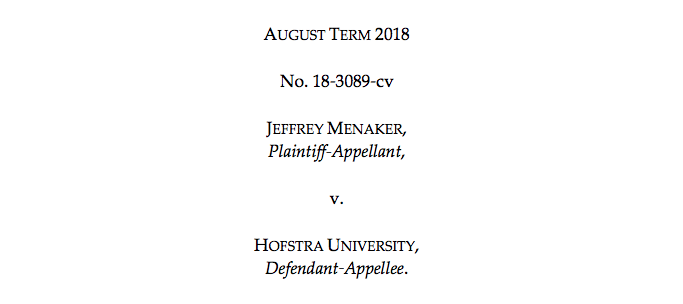- Free Consultation: (631) 352-0050 Tap Here to Call Us
Sexual Harassment: Rights of the Accused

As Long Island employment lawyers, a question we frequently hear from callers is what rights do employees have who have been accused of sexual harassment. Although the exact answer depends on the particular circumstances, unfortunately, the most frequent answer is that the accused does not enjoy many rights, if any at all. This is so because the law favors (and in most cases requires) that employers take action against employees who are engaging in unlawful discrimination and harassment.
Moreover, most employees in New York are at-will, so employers can terminate their employment, for any reason, even for being falsely accused of sexual harassment. But, New York’s federal appellate court has recently issued a decision which enforces that accused employees enjoy some rights, including protections under anti-discrimination laws. Today’s Long Island employment law blog explores the decision in Menaker v. Hofstra University.
In 2011, the United States Department of Education issued a memo to American colleges and universities which required them to “prioritize” investigation of sexual harassment claims. This memo was made in response to prior criticisms of the way schools had been handling harassment complaints. As of 2015, Hofstra was identified as a university which the DOE was investigating for possible mishandling of sexual misconduct claims.
In 2016, Hofstra hired Jeffrey Menaker as Director of Tennis and coach of men’s and women’s tennis teams. A year later, Hofstra received a complaint from the parents of a member of the women’s tennis team alleging that Menaker had engaged in sexual harassment against the female athlete.
Soon after, Menaker attended a meeting with Hofstra’s general counsel and VP of athletics. At the meeting, Menaker saw the parent’s letter for the first time. He denied all the allegations. Menaker was told to collect communications he had with the student, that Hofstra would be investigating the matter, and it would share a report with him soon.
The Court took note that Hofstra maintains a written policy which sets forth the procedure for the school to use to investigate and resolve sexual harassment claims. The formal procedures require interviewing witnesses, allowing the accused to submit a written response, and the Hofstra investigator must produce written determination.
Over the coming months, Menaker provided Hofstra with the requested communications and he identified witnesses who could prove the falsity of allegations. Hofstra did not interview the witnesses. Then, in the fall, Hofstra fired Menaker. Menaker sued, alleging that his sex played a role in the decision to terminate him.
The case ultimately reached appeal. On appeal, the Second Circuit noted that its case law includes a prohibition against universities imposing discipline where gender is a motivating factor in the decision. But, the rule arose in the context of Title IX, which prohibits discrimination in education. Menaker’s case arose under Title VII which prohibits discrimination in employment. So the issue was whether the rule about discipline extends to Title VII. The Court held that all the principles which favored using the rule for Title IX, apply to Title VII, so the rules applies to Title VII.
Next, the Court determined that Menaker showed that he was fired in response to sexual harassment allegations and that Hofstra was under at least some pressure to “react more forcefully” to allegations of male sexual misconduct.
The Court, then, had to determine whether Hofstra used questionable procedures in Menaker’s case which would suggest that Hofstra was biased. The Court reviewed that procedural irregularities which could suggest bias may include, favoring one party’s version of facts over the other or accepting an unsupported version of an accusation while refusing to explore testimony which may refute those allegations.
Applying these factors to Menaker, the Court was persuaded that Hofstra deviated from its established procedures. The Court noted that Hofstra did not interview relevant witnesses identified by Menaker, that Hofstra terminated Menaker even though it knew some accusations were false and may have been a ploy, and Hofstra did not provide Menaker with the report it promised to give him.
In sum, the Court held that the procedural irregularities suggested that Hofstra terminated Menaker, at least in part, because of his sex.
The Menaker case serves as an important reminder to employers. While anti-discrimination laws are becoming stricter and employers must act to address, stop, and prevent sexual harassment in the workplace, they must do so in accordance with their established procedures. Moreover, employers must not believe a female’s accusations over a male’s rebuttal of those accusations. Employers should perform a fair investigation and consider any and all evidence provided by the accused, as well of course, as that of the accuser.
Though the rights of the accused are limited, at a minimum, the accused cannot be condemned to guilt based on being male. A decision on the merits of a sexual harassment claim must be based on evidence, and not the sex of the parties involved.
If you have questions about sexual harassment in the workplace, contact a Long Island employment lawyer at 631-352-0050. More information about sexual harassment can be found on our website located at http://linycemploymentlaw.com.
The rights of the accused- Menaker v. Hofstra









